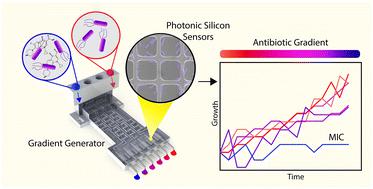Our official English website, www.x-mol.net, welcomes your
feedback! (Note: you will need to create a separate account there.)
A 3D-printed microfluidic gradient generator with integrated photonic silicon sensors for rapid antimicrobial susceptibility testing
Lab on a Chip ( IF 6.1 ) Pub Date : 2022-11-22 , DOI: 10.1039/d2lc00640e Christopher Heuer 1, 2 , John-Alexander Preuss 1, 3 , Marc Buttkewitz 1 , Thomas Scheper 1 , Ester Segal 2 , Janina Bahnemann 1, 3
Lab on a Chip ( IF 6.1 ) Pub Date : 2022-11-22 , DOI: 10.1039/d2lc00640e Christopher Heuer 1, 2 , John-Alexander Preuss 1, 3 , Marc Buttkewitz 1 , Thomas Scheper 1 , Ester Segal 2 , Janina Bahnemann 1, 3
Affiliation

|
With antimicrobial resistance becoming a major threat to healthcare settings around the world, there is a paramount need for rapid point-of-care antimicrobial susceptibility testing (AST) diagnostics. Unfortunately, most currently available clinical AST tools are lengthy, laborious, or are simply inappropriate for point-of-care testing. Herein, we design a 3D-printed microfluidic gradient generator that automatically produces two-fold dilution series of clinically relevant antimicrobials. We first establish the compatibility of these generators for classical AST (i.e., broth microdilution) and then extend their application to include a complete on-chip label-free and phenotypic AST. This is accomplished by the integration of photonic silicon chips, which provide a preferential surface for microbial colonization and allow optical tracking of bacterial behavior and growth at a solid–liquid interface in real-time by phase shift reflectometric interference spectroscopic measurements (PRISM). Using Escherichia coli and ciprofloxacin as a model pathogen-drug combination, we successfully determine the minimum inhibitory concentration within less than 90 minutes. This gradient generator-based PRISM assay provides an integrated AST device that is viable for convenient point-of-care testing and offers a promising and most importantly, rapid alternative to current clinical practices, which extend to 8–24 h.
中文翻译:

具有集成光子硅传感器的 3D 打印微流体梯度发生器,用于快速抗菌敏感性测试
随着抗菌素耐药性成为全球医疗保健机构的主要威胁,对快速床旁抗菌素敏感性测试 (AST) 诊断的需求至关重要。不幸的是,大多数当前可用的临床 AST 工具冗长、费力,或者根本不适合即时检测。在此,我们设计了一种 3D 打印的微流体梯度发生器,可自动生成临床相关抗菌剂的两倍稀释系列。我们首先建立这些生成器对经典 AST 的兼容性(即, broth microdilution),然后将其应用扩展到包括完整的片上无标签和表型 AST。这是通过光子硅芯片的集成实现的,它为微生物定植提供了一个优先表面,并允许通过相移反射干涉光谱测量 (PRISM) 实时光学跟踪固液界面上的细菌行为和生长。使用大肠杆菌和环丙沙星作为模型病原体-药物组合,我们在不到 90 分钟内成功确定了最低抑菌浓度。这种基于梯度发生器的 PRISM 测定提供了一种集成的 AST 设备,可用于方便的即时检测,并提供了一种有前途且最重要的是,可以快速替代当前的临床实践,后者可延长至 8-24 小时。
更新日期:2022-11-22
中文翻译:

具有集成光子硅传感器的 3D 打印微流体梯度发生器,用于快速抗菌敏感性测试
随着抗菌素耐药性成为全球医疗保健机构的主要威胁,对快速床旁抗菌素敏感性测试 (AST) 诊断的需求至关重要。不幸的是,大多数当前可用的临床 AST 工具冗长、费力,或者根本不适合即时检测。在此,我们设计了一种 3D 打印的微流体梯度发生器,可自动生成临床相关抗菌剂的两倍稀释系列。我们首先建立这些生成器对经典 AST 的兼容性(即, broth microdilution),然后将其应用扩展到包括完整的片上无标签和表型 AST。这是通过光子硅芯片的集成实现的,它为微生物定植提供了一个优先表面,并允许通过相移反射干涉光谱测量 (PRISM) 实时光学跟踪固液界面上的细菌行为和生长。使用大肠杆菌和环丙沙星作为模型病原体-药物组合,我们在不到 90 分钟内成功确定了最低抑菌浓度。这种基于梯度发生器的 PRISM 测定提供了一种集成的 AST 设备,可用于方便的即时检测,并提供了一种有前途且最重要的是,可以快速替代当前的临床实践,后者可延长至 8-24 小时。











































 京公网安备 11010802027423号
京公网安备 11010802027423号